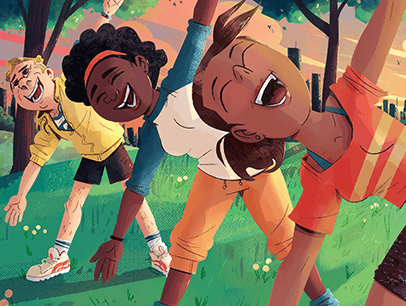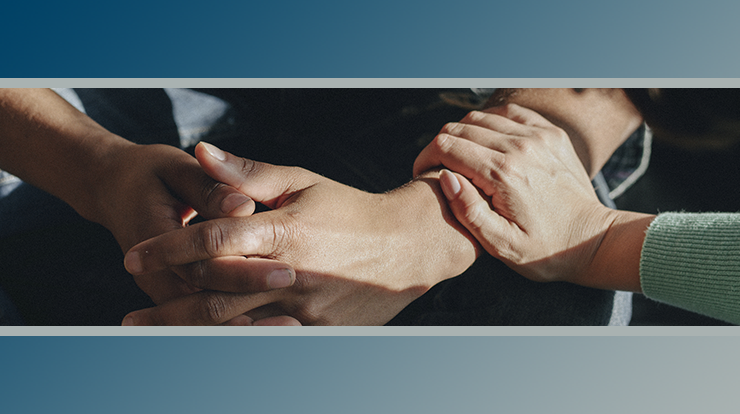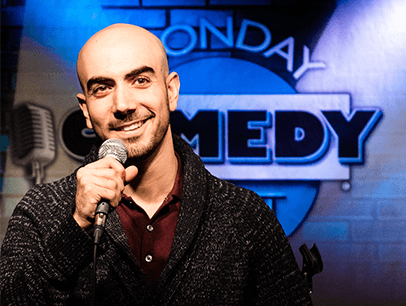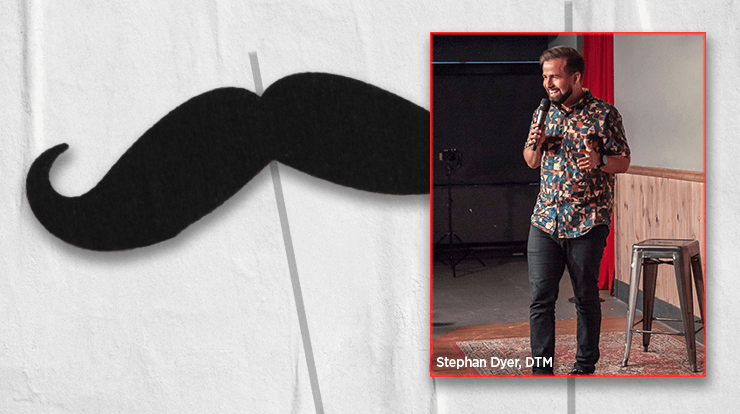
Have you ever worked in customer service? Ola Aralepo has. And he lived to tell about it—in a Toastmasters Humorous Speech Contest.
Aralepo, DTM, shared his grievances over dealing with rude, self-entitled patrons of the London Underground—also known as the Tube—where he worked many years as a customer service adviser. Recalling one particularly belligerent man who hurled questions at him, Aralepo got down on his knees in the 2017 speech, in mock worship of “his majesty, the customer”: “Whatever you are about to say next, you are right. I’m here for you to use and abuse as you choose.”
As recreated by Aralepo, the Tube tyrant blathers on and Aralepo’s boss, sensing his employee’s building frustration, pulls him aside and urges him to simply let it go: “Otherwise, you’ll spend the rest of your life trying to state the stupidly obvious to the obviously stupid.”
Zing! Aralepo says the speech—with which he won the District contest—felt like a vicarious verbal clapback to the disrespectful customers of the world, made all the more satisfying by the roaring laughter of the audience.
“That was my therapy,” he says in an interview over Zoom. “By the time I gave that speech, I had left the job at the London Underground. The speech was like a catharsis.”
Healthy Humor
Aralepo has spent a great deal of time examining how humor serves as an emotional release valve. He sees a strong link between comedy and mental health, and he’s mined that connection in his studies and his work as a counselor and coach, including the value of incorporating humor into the educational field.
Since 2006, he has been a member of Tube Talk Toastmasters, a community club that started as a corporate club for London Underground employees. He first heard about Toastmasters when he took a course offering strategies to succeed in the music business. (He was an aspiring songwriter at the time.) The instructor was Dec Cluskey, lead singer for the ’60s pop group The Bachelors. Cluskey is a Toastmaster (he now has a DTM) and recommended the organization as a great place to overcome the fear of networking.
“He’s such a breath of fresh air and so giving of his time.”
—Helena Boden-Brewer, DTMAralepo says he had never thought of himself as funny, but when he delivered his Ice Breaker, his evaluator told him he had a great sense of humor. That changed everything for the new Toastmaster. The feedback gave him the confidence to experiment with humorous speeches. (He still has the education manual with the evaluator’s comments.) By the time he earned his Competent Communicator (CC) award, the dream of becoming a songwriter was on life support: He saw humorous speaking as a more authentic addition to his vocation.
Aralepo continued to progress, and in 2011 he won the District-level Humorous Speech Contest. District Director Helena Boden-Brewer, DTM, praises his improvement and style of observational humor—the way he has fun with relatable topics such as Facebook issues, public transportation, and personal identity.
“I think he’s a much more confident performer than before and has a delivery style which he didn’t have originally—his expressive facial expressions, the raise of an eyebrow, just something about the way he comes across, which is why I really love watching Ola perform,” she says.
A Stand-Up Guy
Eventually Aralepo ventured into the arena of stand-up comedy, performing at open mic nights in London and South England comedy clubs. He also brought groups of fellow Toastmasters to comedy venues, urging them to try stand-up themselves. He notes that watching and doing stand-up comedy is a great way to improve your humorous speaking. “You get a sense of the timing, and what works and what doesn’t work,” says Aralepo, who has continued to do stand-up off and on through the years. (He also performed a solo show at the Edinburgh Fringe Festival in 2017.)
Among the topics he tackles in his comedy is the tricky act of cultural navigation. Aralepo was born in London to Nigerian parents, but the family moved to Lagos, Nigeria, and he grew up there. As a young adult, he returned to London at the urging of his parents, who felt he had much better economic opportunities in England. (“You know you have a problem when your own mother tells you to go back where you came from,” he quips.)
Being both Nigerian and British, with the inherent pressure to assimilate, can result in cultural confusion, says Aralepo. He points out how parents in Nigeria, as in other developing countries, desperately want their children to pursue practical, well-paying occupations. Which plays into one of his comedic bits:
“When I told my dad I wanted to be an actor, he said, ‘It’s pronounced doctor.’”
Onstage Therapy
Aralepo, a qualified counselor (in England the term refers to the general equivalent of a psychotherapist), taps into the common ground between stand-up comedy and psychotherapy. As he points out, “The therapy room and the comedy club are the only two places in society where it’s permitted to talk about taboo subjects, such as sex, aggression, and other issues.”
In 2016 he enrolled in a master’s program called Performance Practice as Research, at London’s Royal Central School of Speech and Drama. There he developed what he calls Stand-Up Therapy™ (he’s trademarked the term), which explores how humor can help foster emotional and psychological well-being.
The concept embraces more than stand-up comedy; it encompasses humorous expression in all forms, whether it be funny speeches or interpersonal communication. As a counselor/school project manager for Place2Be, a nonprofit organization that helps children with mental health struggles, Aralepo tries to incorporate humor, when appropriate, into his campus presentations or one-on-one sessions. In one such “play therapy” session with a student, he jokingly took on the persona of a gruff football coach, helping to amuse and calm the boy.
Now he’s trying to help teachers as well. He’s currently in a doctorate (EdD) program at the UCL Institute of Education in London, with a focus on helping those who are training to be teachers use humor to boost their confidence and competence in dealing with classroom-related mental health issues.
Positive District Presence
Aralepo is well-known in District 91 (the southern United Kingdom) for his friendly manner and positive contributions. He has consistently participated in speech contests, delivered workshops, and mentored other speakers.
“He’s such a breath of fresh air and so giving of his time,” says Boden-Brewer, the District Director.
One of those he’s helped is Tazud Miah. In 2015, he agreed to mentor Miah when the latter entered the Humorous Speech Contest. Like Aralepo himself when he first started in Toastmasters, Miah says he didn’t think of himself as a funny person. But Aralepo saw potential in him and invested himself in Miah’s growth.
“The therapy room and the comedy club are the only two places in society where it’s permitted to talk about taboo subjects.”
—Ola Aralepo, DTM“Ola really helped me as a mentor,” says Miah, a member of the Early Bird Speakers in London. “He made me work harder than anybody else I’ve had as a Toastmasters mentor.” The work paid off when Miah won the District contest that year. His mentor’s reaction? “He was immensely proud.”
Aralepo is also encouraging at his club meetings. As the Table Topicsmaster at one meeting this past summer, he empathized with those daunted by the activity, especially newer members. “When I first joined Toastmasters, Table Topics produced titanic terror in my soul,” he said (deftly working in the word of the day). “It still does.” He urged members to take a chance and not worry about the result.
As for what Toastmasters has given him, Aralepo expresses deep gratitude for many insights and assists. If he hadn’t received the encouragement to try humorous speaking, first by his club members and later by mentors within the District, he wouldn’t have tried stand-up comedy and never would have drawn on the healing aspect of humor as a professional cornerstone.
“I would say Toastmasters gave me the career I have right now.”

Paul Sterman is senior editor, executive and editorial content, for Toastmasters International. Reach him at psterman@toastmasters.org.



 Previous
Previous
 Previous Article
Previous Article



